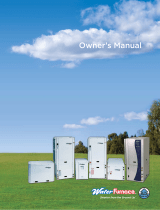
6
These numbers are approximate and represent operation with a typical system. Actual
temperature differentials and run times may vary widely based on your building and equip-
ment, as well as outdoor temperature conditions.
ment range for COOLING is from 9 to 40.
The factory preset is 12 (13 for heat pump).
The cooling will not go below 9 because
compressors require a longer cycle. The
adjustment range for AUXILIARY (heat
pump only) is from 1 to 40. The factory
preset is 6.
The chart below shows how this adjustment
range affects thermostat performance.
PROGRAMMABLE COOL FAN-OFF
AND FAN-ON DELAY.
(Installer table steps 7 and 8.) These items
allow a selection of 0 to 127 seconds of fan-
off delay after the thermostat has satisfied the
call for cool, or a fan-on delay of 1 to 30
seconds on a call for cool (or heat pump
compressor activation).
The fan-off delay allows the fan to continue
running after the compressor has shut off.
This distributes the cool air that would
otherwise stay trapped in the air conditioning
coils through the ducts. Ideally the timing
would be set so the fan shuts off just as the
cool air is exhausted. If this timing is set too
long the fan may begin blowing warm air
before it shuts off. Shortening the fan-off
delay will prevent this.
A short delay to allow the A-coil to cool
off (or warm up in heat pump) before the
fan turns on may be preferred. This also
allows the compressor and the fan to come
on at slightly different times, which allows
full power to the compressor on start up.
Recommended setting for fan-on delay is
10 seconds or less. A system that does not
have a high head pressure cutout should
have a delay of 10 seconds or less.
PROGRAMMABLE HEAT FAN-OFF
DELAY.
(Installer table step 9.) This item allows a
selection of 0 to 127 seconds of fan-off delay
after the thermostat has satisfied the call for
heat.
The fan-off delay allows the fan to continue
running after the burner, heating element,
etc. has shut off. This distributes the heat that
would otherwise stay trapped in the ducts.
Ideally the timing would be set so the fan
shuts off just as the warm air is exhausted. If
this timing is set too long the fan may begin
blowing cool air before it shuts off. Shorten-
ing the fan-off delay will prevent this.
PUMP (FOSSIL FUEL KIT ALTER-
NATIVE).
(Installer table step 10; heat pump only) This
item controls heat pump compressor
operation with a fossil fuel auxiliary. This
menu item may eliminate the need for a
separate fossil fuel kit, although we recom-
mend that you consult the heat pump system
manufacturer before using this feature
instead of a kit. This item will allow the
thermostat to turn the heat pump compressor
off if the auxiliary is on for more than one
minute, to prevent compressor head pressure
from getting too high. To use this feature
instead of a kit, select PUMP OFF.
COMPRESSOR LOCKOUT.
(Installer table step 11). This thermostat is
capable of protecting the system against
premature compressor failure by “locking
out” the compressor for at least five minutes
after each cycle. When the thermostat is in
compressor lockout, the word COOL will
flash on the display. With heat pump
systems, the word HEAT will flash if the
lockout occurs during a heat cycle. During
this period, the compressor will not be
energized.
Lockout Bypass Option
FOR QUALIFIED SERVICE TECH-
NICIANS’ USE ONLY.
HOMEOWNERS SHOULD NOT USE
THIS FEATURE DUE TO POSSIBIL-
ITY OF EQUIPMENT OR PROP-
ERTY DAMAGE, OR PERSONAL
INJURY.
COMPRESSOR SHORT TERM CYCLE
PROTECTION
If this thermostat has been configured to
provide short-cycle protection, during the
5-minute lockout period the thermostat
will lock out the compressor to allow
head pressure to stabilize. To override
this feature for one cycle while testing
thermostat operation, press SET
TIME
and SET
DAY
buttons at the same time.
If the system has short-cycle protection, this
item should not need to be enabled. How-
ever, if your system does not have short-
cycle protection, turn COMP LOCK ON.
This will protect the compressor from short-
cycling and potential premature compressor
failure.
Note that COMP LOCK OFF permanently
disables compressor lockout. If you need to
temporarily disable compressor lockout,
please see Lockout Bypass Option.
ECONOMIZER FEATURE.
(Installer table step 12). This item allows
longer Y1 cycles for cooling with outdoor
air.
DISABLING AUTOMATIC
CHANGEOVER MODE.
(Installer table step 13). This thermostat, as
configured at the factory, provides automatic
changeover, which allows the thermostat to
switch between heating and cooling to
maintain temperature. In this configuration,
when you press the SYSTEM button, the
thermostat will go through HEAT-OFF-
COOL-AUTO modes (HEAT-EMER-OFF-
COOL-AUTO for heat pumps). Select
HEAT(-EMER)-OFF-COOL to disable the
automatic changeover feature.
OPTIONAL REMOTE TEMPERA-
TURE SENSE.
(Installer table steps 14 through 16). Up to
three remote sensors (part # F145-1328) can
be attached to this thermostat to sense indoor
temperature at locations away from the
thermostat. Each sensor may be located as
far as 200 feet away from the thermostat.
This is an excellent feature if the thermostat
is in a poor location for sensing temperature
or if you want to install the thermostat in a
separate room to prevent tampering. (Refer
to the installation instructions included with
the remote sensor for proper installation and
wiring.) After installing and connecting the
remote sensor(s) to the thermostat, use these
menu items to enable each remote indoor
temperature sensor (A, b and/or C). Note that
if SENSOR A, b or C are set to ON in the
menu, but no sensor is installed, or if the
HEATING COOLING
Anticipation Value Cycle Length Differential Temperature Cycle Length Differential Temperature
Shorter 0.4–0.6°F (0.2–0.3°C) N/A1–8 N/A
Longer Shorter9–20 0.6–1.0°F (0.3–0.6°C) 0.6–1.0°F (0.3–0.6°C)
Hydronic Longer21–40 1.0–1.6°F (0.6–0.9°C) 1.0–1.6°F (0.6–0.9°C)
(Continued on page 7)









